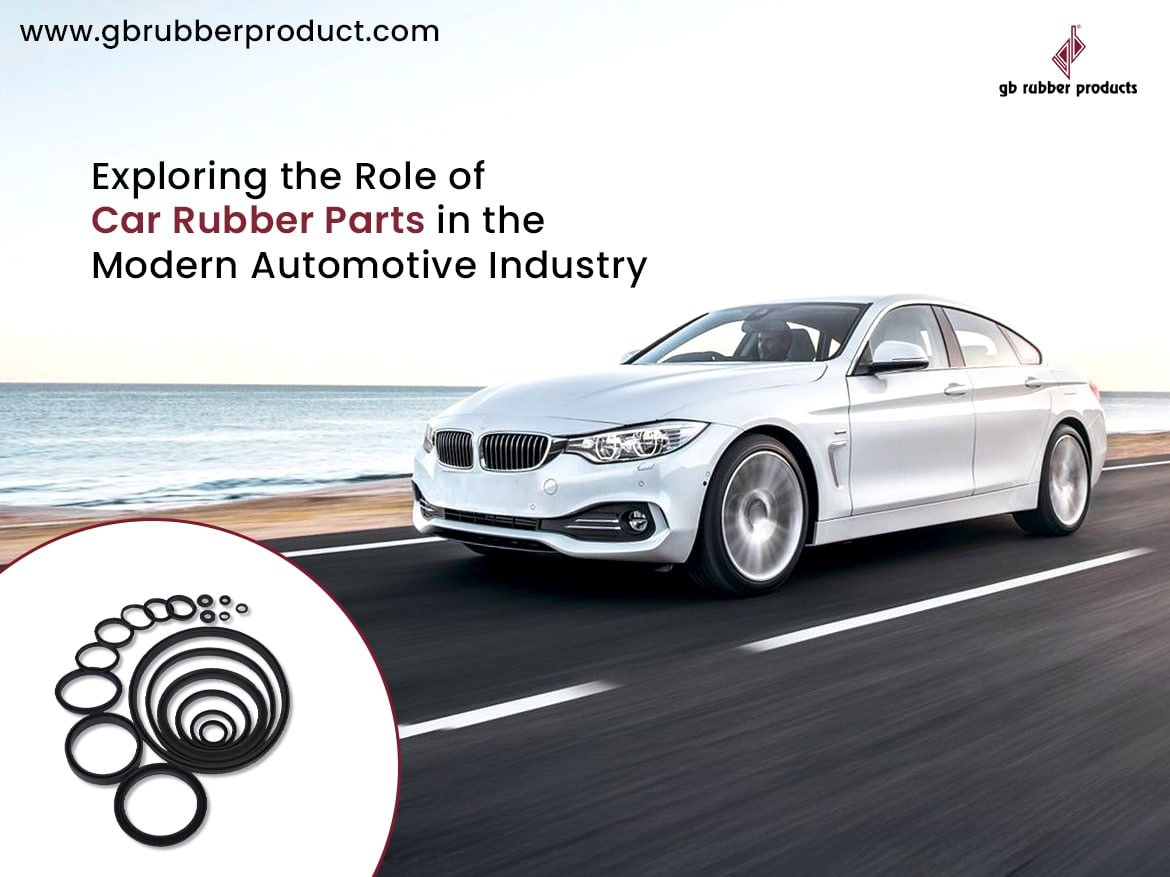If you’ve ever taken a closer look at the intricate design of your car, you’d be surprised by how many components rely on rubber.
From the tires that keep you rolling to the seals ensuring efficiency under the hood, rubber parts are indispensable to modern vehicles. But have you ever stopped to think about why rubber is so vital for the automotive world? It’s not just about durability – it’s about providing the safety, performance, and longevity that today’s consumers demand from their vehicles.
In this blog, we’ll explore the critical role that rubber parts manufacturers play in the automotive industry, the different types of rubber used in vehicle production, and understand why rubber moulded products manufacturers in India are setting the standard for innovation in the sector.

The Role of Rubber in the Automotive Industry
Rubber may not always be the first thing that comes to mind when we think about vehicles, but it’s essential for more than just tires. The rubber industry is responsible for crafting countless components that contribute to vehicle performance, safety, and efficiency. The flexibility, durability, and resistance that rubber offers make it the ideal material for many crucial parts.
Rubber: A Material that Does It All
Flexibility: Rubber adapts to extreme conditions, bending and flexing where needed. It’s this property that makes rubber perfect for seals and gaskets in engine systems, where tight fittings are crucial.
Durability: Rubber parts are built to last, withstanding the wear and tear of daily driving, temperature fluctuations, and road conditions.
Resistance: Rubber’s resistance to heat, chemicals, oils, and pressure is what makes it such a versatile material for automotive components. Whether it’s exposure to engine heat or the constant friction of the road, rubber withstands these forces with ease.
Common Applications of Rubber Car Parts in Vehicles
Let’s take a deeper dive into the specific areas where rubber components play a pivotal role in vehicle design.
Tires
The most obvious application of rubber in vehicles is in the tires. Tires are engineered from a specialized blend of rubber compounds designed to handle not only the road’s surface but also varying weather conditions. The tire’s grip on the road ensures stability, while its durability provides longevity.
Seals and Gaskets
Another vital yet often overlooked application of rubber in vehicles is in seals and gaskets. These components ensure that fluids – such as oil, coolant, and fuel – stay where they belong. Through advanced rubber parts manufacturing, high-quality seals prevent leaks and maintain system integrity, all while withstanding extreme temperatures and pressures.
Shock Absorption
When it comes to driving comfort, rubber components such as bushings, mounts, and hoses help absorb shocks and vibrations. These rubber parts provide stability and reduce noise, contributing to a smoother, quieter ride.
Other Applications
Rubber’s versatility extends beyond tires and seals. In addition to these essential components, rubber is used in a variety of applications, like rubber nozzles for industrial machinery and insulators for electrical systems in vehicles. These parts are crucial for both the performance and safety of modern vehicles.
Types of Rubber Used in the Automotive Industry
The rubber used in automotive components varies depending on the specific application and required properties. Here’s a look at some of the most commonly used types:
- Natural Rubber: Known for its elasticity, it’s commonly used in suspension components and engine mounts.
- EPDM (Ethylene Propylene Diene Monomer): This synthetic rubber is highly resistant to heat, UV radiation, and weather, making it ideal for weather stripping, seals, and hoses.
- Nitrile Rubber: Resistant to oils and fuels, nitrile rubber is primarily used in fuel system seals.
- Silicone Rubber: Known for its excellent heat resistance, silicone is commonly found in turbocharger hoses and other high-temperature automotive components.
The Importance of Quality in Rubber Manufacturing
With the growing demand for high-performance vehicles and more stringent regulatory requirements, the automotive industry demands quality rubber components that can stand up to the toughest conditions. That’s where rubber moulded products manufacturers in India come into play.
India has become a major hub for rubber parts manufacturing, with manufacturers using cutting-edge technologies to meet global standards.
We at GB Rubber have invested in advanced molding techniques, such as rubber injection molding, to produce highly durable, high-performance products that meet the strict specifications of the automotive industry.
The Future of Rubber in Automotive Manufacturing
The automotive industry is evolving to meet both technological advancements and consumer demands for sustainability. One of the significant trends in the industry is the increased focus on eco-friendly rubber products.
Rubber recycling is gaining momentum, with manufacturers exploring ways to repurpose old rubber into new, high-quality components. This approach not only helps reduce waste but also contributes to the growing demand for sustainable, eco-conscious manufacturing practices.
GB Rubber: Supporting the Automotive Industry with Quality Rubber Products
Rubber’s role in the automotive industry cannot be overstated. From tires that keep us safe on the road to seals that ensure efficiency under the hood, rubber parts manufacturers are at the heart of vehicle performance and safety. As manufacturers like GB Rubber continue to innovate and produce high-quality rubber moulded products, the future of rubber in automotive manufacturing looks strong, sustainable, and full of potential.
Please visit our website or get in touch with our experts to find out the best solutions for your rubber components needs.



